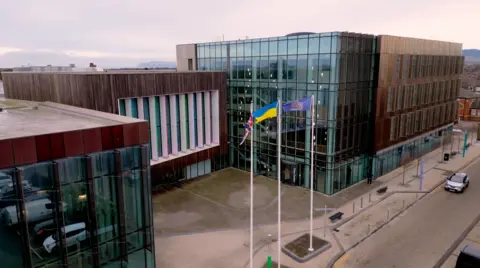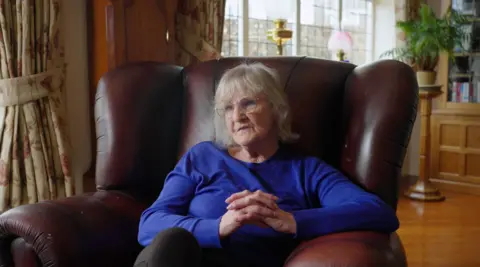 BBC
BBCWithin the early hours an IT engineer raced into work via the darkish, wintery streets of Redcar in north-east England.
The sprint was prompted by a worrying alert in regards to the council’s laptop community, and he was quickly hurriedly shutting down servers to attempt to halt the unfold of a virus. It was too late.
Hackers had scrambled Redcar and Cleveland Council’s IT programs and would soon demand payment to revive it.
The cyber-attack in February 2020 brought about chaos, disrupting every little thing from bin collections to social providers and choices about preserve weak youngsters secure.
“I received a cellphone name to say: we have been hit,” recollects Mary Lanigan, then chief of the council. “The destruction of our programs was complete.”
In latest weeks, cyber-criminals have focused main retailers together with M&S and the Co-Op, resulting in empty cabinets and breaches of buyer information.
However the former head of the Nationwide Cyber Security Centre (NCSC), Ciaran Martin, stated his “greatest cyber-security fear” was the specter of simultaneous assaults on public providers, like councils and hospitals, which had the potential to “wreck lives”.
The BBC has been investigating how the assault on Redcar and Cleveland unfolded, what it took to get issues again to regular and the influence on native folks.

Within the days earlier than Saturday 8 February 2020, an e mail with a seemingly innocuous attachment arrived in a council inbox. Hidden inside was a bit of malicious software program that might lie dormant within the council’s community till it was activated remotely.
Inside just a few hours of that activation it had unfold all through the pc system, locking employees out and scrambling recordsdata.
By 11:00 GMT on Saturday, native residents started to note the council web site was offline.
“There wasn’t lots we may do,” Mrs Lanigan stated about efforts to cease the virus.
“You needed to be sensible, so it was truly getting extra telephones in there so that folks may ring us.”
Information was spreading, however Mrs Lanigan, who misplaced her place within the 2023 native elections, claims she obtained strain from council officers and central authorities to not communicate out.
The council declined to be interviewed in regards to the assault however stated there had been no strain or instruction to not communicate publicly, both on the time or since.
What Mrs Lanigan didn’t say in 2020, however admits now, was the council was coping with a disaster.
“It was devastating,” she stated. “Devastating for us, for the employees, for the general public and for everyone else.”
They’d misplaced the flexibility to share data with police and the NHS, whereas social providers and aged care providers have been knocked out, she stated.
“Even anyone ringing up and saying ‘my bin hasn’t been emptied’ wasn’t handled.”

By the morning of Monday 10 February IT employees have been desperately going from desk to desk, inserting contaminated computer systems in a rising pile.
“After we noticed how a lot harm had been brought about we realised it might in all probability take weeks, perhaps years to do,” stated IT employee Ben Saunders.
On the identical time, specialists on the NCSC – a part of GCHQ – have been contemplating the council’s plea for assist.
Mr Martin, who was the NCSC’s chief govt on the time, stated it was “unusually severe”.
“If a council are telling you they’re anxious about their capability to run providers for weak youngsters, you’re taking that very severely.”
It was feared social staff, tasked with preserving younger folks secure, would wrestle to do their jobs with out entry to the net information they relied on to assist inform tough choices.
In what Mr Martin referred to as an “uncommon” step, NCSC officers have been deployed to Redcar.
On Tuesday 11 February – the second working day after the assault – hackers made their ransom demand.
The precise determine has by no means been made public, however Mr Martin stated that, based mostly on related assaults, it was more likely to have been within the “low single determine thousands and thousands of US {dollars}”.
The present authorities is contemplating a ban on the general public sector paying ransoms to hackers however, whereas it’s the steering, there was no formal ban in place in 2020.
Regardless, Mrs Lanigan was in no thoughts to cough up. “I am a Yorkshire lady and the factor being about that’s there was no approach I used to be paying any ransom to anyone.”
The next day, Wednesday 12 February, the federal government held a Cobra assembly, designed to co-ordinate the response to main emergencies.
“That is whenever you realised simply how severe it was,” the previous council chief stated. “It wasn’t just a few hacker sat in a bed room having a play with computer systems.”

Whereas the system was being rebuilt, the council turned the clocks again and returned to using paper and pen. Many capabilities floor to a halt or have been dramatically slowed down.
Redcar husband and spouse Paul and Clare have been “very reliant on the council” on the time.
Clare wanted help from care staff and specialist gear to assist with a debilitating situation referred to as useful neurological dysfunction.
“You would be ready on the cellphone for hours,” Paul stated. “When folks have been coming it was handwritten notes, so the programs weren’t getting up to date. It was an actual nightmare.”
The couple waited many months earlier than they received the help they wanted. Within the meantime, Paul had stop his job to look after his spouse.
All of the whereas employees continued to work on getting the council again on-line and inside just a few weeks a brief system for social providers had been restored.
By Could 2020 the council stated it was still only back to 90%, with the system taking 10 months to be absolutely restored.
“A few of it was in a position to be recovered; plenty of it was wanted to be constructed from scratch,” stated Mr Saunders. “It was a really meticulous, very lengthy course of.”
But it took a number of years earlier than proof emerged suggesting who was behind the cyber-attack.
In February 2022, one of many world’s most prolific ransomware gangs, the Russia-based Conti Group, fell aside.
After Russia invaded its neighbour, pro-Ukrainian hackers leaked the group’s personal messages and information, revealing particulars of a few of the most harmful cyber-criminals.
A 12 months later, in February 2023, a gaggle of Russian hackers were sanctioned by UK and US authorities over a string of assaults on companies, faculties and councils, together with Redcar and Cleveland.
 Getty Pictures
Getty PicturesEarlier that 12 months, Mrs Lanigan gave proof in Parliament in regards to the assault. She stated the response had cost £11.3m and they had received £3.68m compensation from the federal government.
Because the authority was not insured for the assault, the distinction needed to be taken from its restricted reserves.
A council spokesman stated that whereas it had basic insurance coverage cowl, it nonetheless didn’t have a particular coverage which lined a cyber-attack.
They stated a latest inspection by exterior auditors discovered that on the time the council had had correct preparations and controls in place to scale back the chance of a cyber-security breach.
However it’s removed from the one council to face such an assault. In response to the Info Commissioner’s Workplace, there have been 202 ransomware assaults on native authorities in 2024.
The federal government stated it was “taking motion to guard native councils by offering funding to extend their cyber defences”.
However Mr Martin fears the assault on the council, and different public providers, may have “proven hostile nation states disrupt our society”.
“Redcar and Cleveland was a disaster,” he stated. “What about 10 Redcar and Clevelands on the identical time? What a couple of hundred of them? That is not inconceivable.”

